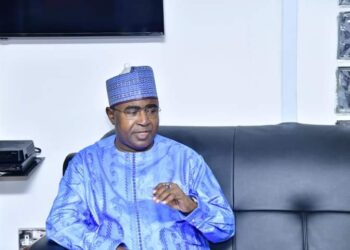 Sen. Sheu Baba Umar, Senator representing Bauchi South Senatorial District, (right) presenting an Award of Appreciation to Lagos State Deputy Governor, Dr. Kadri Obafemi Hamzat (left) as the Keynote Speaker at the 30th University of Lagos Muslim Alumni Pre-Ramadan Lecture, held at the J. F Ade Ajayi Auditorium, University of Lagos, Akoka, Yaba.
Sen. Sheu Baba Umar, Senator representing Bauchi South Senatorial District, (right) presenting an Award of Appreciation to Lagos State Deputy Governor, Dr. Kadri Obafemi Hamzat (left) as the Keynote Speaker at the 30th University of Lagos Muslim Alumni Pre-Ramadan Lecture, held at the J. F Ade Ajayi Auditorium, University of Lagos, Akoka, Yaba.
Dr. Kadri Obafemi Hamzat, Lagos State Deputy Governor has advised Muslim faithfuls in the country to use Ramadan as a period of devotion and contemplation, to rededicate themselves to the doing and promotion of the will of Allah.
He gave the advice while speaking as a keynote speaker at the 30th University of Lagos Muslim Alumni Pre-Ramadan Lecture, with the theme; ‘Transformative Power of Ramadan’ held at the J. F Ade Ajayi Auditorium, University of Lagos, Akoka, Yaba.
According to him, “Wherever we are, whatever our status is, we must promote the will of Allah. Our personal resolve to create impact individually will create such outstanding changes that will enable humanity to prosper.
He said that Muslims must promote the will of Allah and must be able to replicate the heaven Allah envisions for them, describing the month of Ramadan as sacred for Muslims, stressing that Muslims should extend the impact of Ramadan beyond the one-month fasting period.
Speaking further, he charged Muslim Clerics to domesticate their preaching in line with our societal values, norms, and morals to build a better nation, stressing that Allah’s intention for creating mankind is for man to worship and serve Him alone.
While highlighting some challenges facing humanity in the present day with the invention of technology and Artificial Intelligence (AI), Hamzat noted that the world has arrived at the most challenging part of human existence, as some of the issues are of social and economic significance as well as orientations and perceptions that impinge on humanity.
“We clearly must address them quickly too. The tide of individualism, as a way of life, must be confronted and fast. The ebbing of the societal moral compass needs to be arrested. If we fail the consequences are just too high to contemplate,” he said.
Professor Moshood Baderin, in his lecture, with the theme ‘Islam and the Interception of Humanity and Religion,’ noted that Islam advocates for a well-structured and just society where citizens have access to the fundamental necessities of life.
He emphasized that Islam harmonizes humanity and faith, encouraging good deeds, support for the less privileged, and positively impacting people’s lives, stressing that combining faith with service to humanity is crucial, not only during Ramadan but also beyond.
He further noted that Ramadan possesses transformative powers that strike a balance between one’s faith and service to humanity, fostering personal growth and positive change. “Ramadan serves as a transformative power which reflects on our faith and our service to humanity Ramadan pushes us to do the goodness in us,” the lecturer said.
Dr. Abdulmumin Alao, President, University of Lagos Muslim Alumni (UMA) earlier in his welcome address, said that the 30th Pre-Ramadan Lecture highlighted the immense benefits embedded in the holy month of Ramadan and how Muslims can find the right balance between the demands of their faith, and the rights of their neighbors which sometimes might be in conflict.
The President stated that the annual Pre-Ramadan Lecture is an avenue to enlighten Islamic Faithfuls more on their roles and responsibilities during the month of Ramadan and beyond.
“As an association of intellectuals, UMA decided to focus on this specific area of need when we noticed the huge shortage of Muslim manpower in the sector,” he said.
Professor Folashade Ogunmola, the Vice-Chancellor of University of Lagos, who was represented by Professor Bola Oboh, the Deputy Vice-Chancellor, Academics and Research, University of Lagos, said that the purpose of fasting during Ramadan is not only to be able to reflect and have a closer working relationship with God, but also to be able to bring the Muslim faithful to the spiritual level that will impact even on people’s daily assignments and on the nation as a whole.
“This is the 30th lecture and we are talking of transformative power. We are hoping that these transformative powers will really reflect in our nation as a whole. Nigeria is at a critical point, whether we like it or not, and I hope we will be able to reflect it in building this nation, Nigeria, into a prosperous nation for everyone, young and old, rich and poor.”




 3 hours ago
19
3 hours ago
19








 English (US) ·
English (US) ·